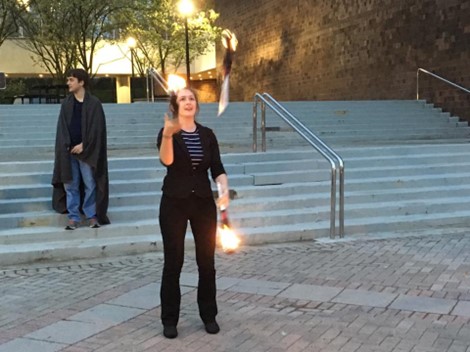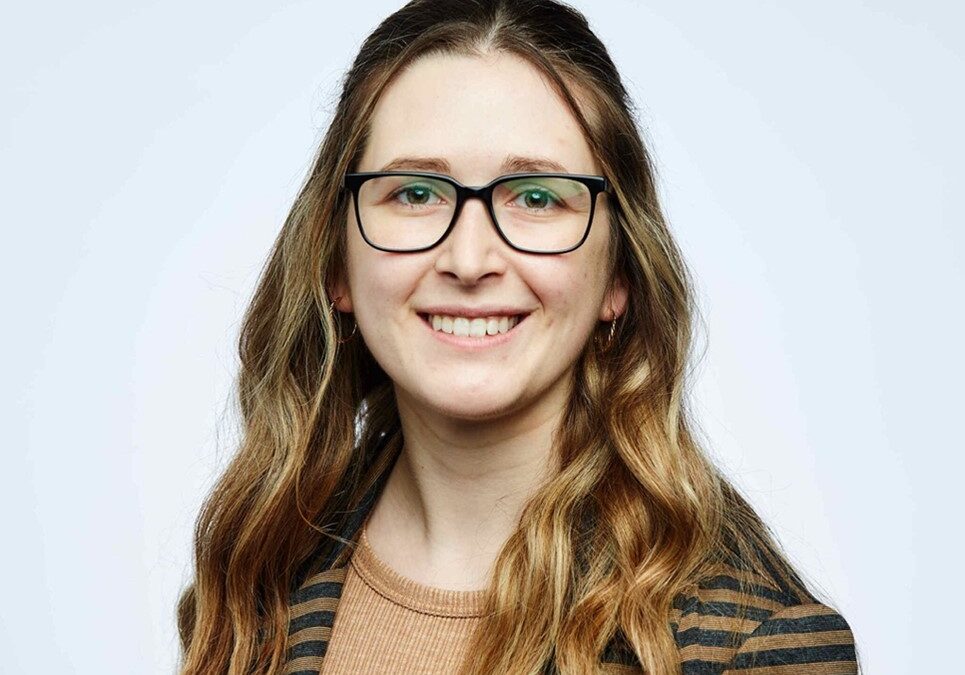Janet Sorrells is a Ph.D. student in bioengineering in Professor Stephen Boppart’s lab
In the summer of 2017, Janet Sorrells arrived at the University of Illinois to perform undergraduate research in Cancer Center at Illinois (CCIL) researcher Stephen Boppart’s Biophotonics Imaging Laboratory as part of a National Science Foundation Research Experience for Undergraduates (NSF-REU).
Today, Janet is a Ph.D. candidate in that same lab, working on developing novel nonlinear optical imaging technologies. She is also a trainee in the CCIL’s Tissue Microenvironment (TiME) program, a university-wide training program for graduate students focused on studying tissue microenvironments to advance biomedical science.
Originally from Massachusetts, Janet didn’t ever expect to live in the Midwest after her REU, especially after applying primarily to graduate programs on the east coast. However, “after visiting, I decided that it had to be Illinois,” she said. “It’s such a large school with diverse people and tremendous resources. I knew that I wanted to join the Boppart lab because he was such a supportive mentor and advocate, and the lab had a good environment during the NSF-REU. I’m really happy with my choice.”
When Janet learned that pursing a doctorate was an option, it felt like a natural choice to continue her education. “I didn’t know anything about obtaining a Ph.D., but I had some really fantastic mentors for undergraduate research who introduced me to the concept of attending graduate school and how the funding works. That helped it become a possibility,” Janet explained.
Growing up, Janet loved learning new things, whether at school or as a hobby like juggling flaming clubs and knives. In fact, she chose to major in biomedical engineering at the University of Rochester because it combined her many academic interests in biology, physics, math, and medicine.

Janet takes a break from her work in the lab for one of her other passions: juggling.
At Rochester, Janet serendipitously discovered her passion for biomedical optics, starting the chain reaction which led her to the Boppart group. She reminisced, “Rochester has a really big optics program, and I didn’t know anything about it before I got there. When I showed up and learned about it, I decided to take a class to try it out, and just by chance I realized I liked it and figured out that it was what I wanted to do.”
After taking a break from engineering to study Chinese language and culture during her fifth year at Rochester, Janet moved to Illinois in 2018 to start her doctorate program in bioengineering and officially joined the Boppart group. “My first couple years of grad school, I spent a lot of time sitting alone in the dark waiting for data to be acquired on really sensitive detectors,” she laughed, referring to her research on the development of improved technologies for fluorescence lifetime imaging microscopy (FLIM). Janet continued, “I created a method 40 times faster than the current gold standard methods.” This novel technology enables the study of fast, dynamic processes such as cancer cell death and extracellular vesicles implicated in cancer metastasis.
Currently, Janet is focused on new developments in coherent anti-Stokes Raman scattering (CARS) imaging, another form of label-free nonlinear optical microscopy. Enhancing the speeds of these various non-linear imaging techniques opens the door to new clinical applications and enables novel biological discoveries, including studying the tissue microenvironment.
“I think one of the significant benefits of nonlinear optics is being able to characterize the tissue microenvironment. That’s what pushed me to apply to the TiME program, and it has been rewarding so far,” remarked Janet. “I would like to thank Professors Rex Gaskins, Marci Pool, and Rohit Bhargava because they have done a great job in supporting the trainees in the CCIL. I’m appreciative for everything they’ve done to develop the TiME program and empower students to excel.”
As she wraps up her doctoral thesis, Janet continues to have fun with her research and looks forward to a future of teaching and mentoring her own research group. Reflecting on her time as a TiME trainee, Janet said, “It is important to connect with the overarching goal of why we are doing this. There are so many people affected by cancer; it is a ubiquitous pain felt by all humanity. I always knew I wanted to do something involving health or medicine, and I lucked out that my passion also might have a positive impact on human health.”
Editor’s note:
This story was written by Katie Brady, CCIL Communications Team

